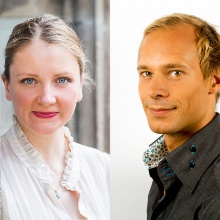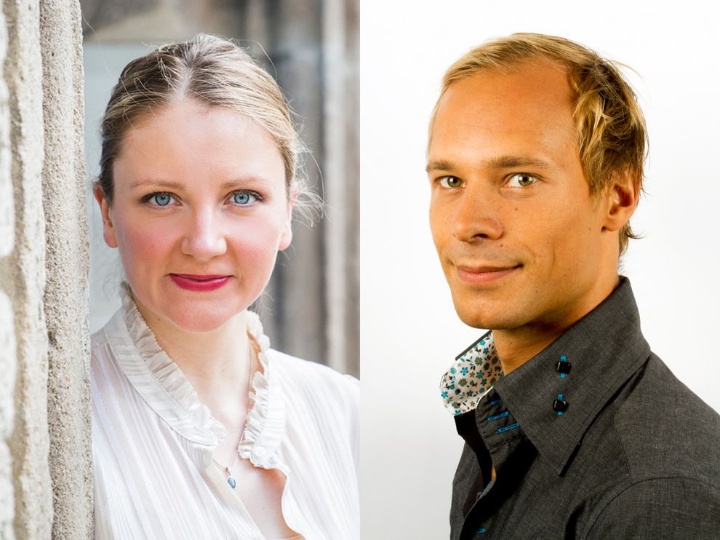In its last plenary session, the Heidelberg Academy of Sciences and Humanities reported on the new projects of the 9th season of the WIN-Kolleg. One of the three funded projects is that of SimTech's Junior Research Group Leader Miriam Klopotek, which she acquired together with Eric Raidl from the Tübingen Cluster of Excellence "Machine Learning: New Perspectives for Science". They succeeded against 25 draft proposals and 11 full proposals.
„It is an honor that the Heidelberger Academy selected our project. We are obliged to become members of the WIN Kolleg and, thus, of the prestigious research community at the Academy. We expect fruitful discussion and debate to emerge with the other WIN project members. Our scientific endeavor is to “join forces” between physics and philosophy to tackle the problem of explainable ML from an unconventional, cross-disciplinary perspective", explains Miriam Klopotek.
As part of the WIN-Kolleg, the Academy has been funding interdisciplinary projects by young scientists since 2002. Now in its ninth season, the WIN-Kolleg examines whether, how and why the reduction of complex issues is necessary for scientific knowledge and what consequences this reduction in complexity has for the relationship between science and society.
The funded project by Raidl and Klopotek addresses these questions with regard to machine learning and goes "In search of explainable and interpretable machine learning with philosophy and physics". The project, which will start in April 2024 and run for three years, offers two researchers the opportunity to work on the topic. It will be carried out as part of the Ethics and Philosophy Lab of the Tübingen Cluster of Excellence "Machine Learning: New Perspectives for Science" and in cooperation with the Interchange Forum for Reflecting on Intelligent Systems (IRIS) at the University of Stuttgart and the Platform of Reflection of the SimTech Cluster of Excellence.
"The collaboration between physics and philosophy has a long tradition that has been somewhat lost in recent decades. We want to build on this tradition and give it a new direction in order to understand artificial learning better and perhaps also more easily. We are very grateful that the Heidelberg Academy is allowing us to do this by funding our project, and we look forward to exchanging ideas in the WIN-Kolleg", states Eric Raidl.
About the project
Machine learning (ML) algorithms are increasingly permeating our everyday lives and public life. They make predictions, but why they decide this way and not otherwise often remains difficult to understand; in a sense, they are "opaque". In our project, we want to understand how this opaqueness arises and how it could be eliminated retroactively. To this end, we want to use insights from physics and other theories of complexity to interpret the nature of the (implicit) abstractions that ML itself generates. Our working hypothesis is that the complexity of ML and the difficulty of understanding certain components of the learning process jointly give rise to the problem of opaqueness. In this sense, a solution does not simply require "more understanding", or "less complexity", but a meaningful reduction in complexity. By this we mean adequate abstractions and non-trivial simplifications that ensure a well-founded approach to understanding. In our project, we will develop tools to analyze the complexity of ML algorithms in new ways and to find meaningful reductions from the perspective of many-body physics and philosophy.
Simulations are an essential part of the physics-based explainability methods of Dr. Klopotek’s portion of the project. The fusion of simulations and ML is an aim of the SimTech research environment, particularly in Project Network 6 “Machine Learning for Simulation". As the philosophy and ethics of AI are one of the foci of the ML Cluster in Tübingen, in particular the socio-politically relevant topic of explainability, this project represents a successful combination of the research goals of both clusters.
The project leaders
Dr. Miriam Klopotek has been an Independent Junior Research Group Leader at SimTech since 2022. She is developing explainability methods for machine learning based on the physics of many-body systems, which embody the conception of complex and emergent behavior in nature. She also explores how many-body systems can process information and, thus, compute and effectively solve learning problems, offering new perspectives for unconventional computing. Before coming to SimTech, Dr. Klopotek was an Early Career Group Leader at the ML Cluster of Excellence at the University of Tübingen. There, she earned her doctorate in physics in 2021 for her prized dissertation on statistical physics.
PD Dr. Eric Raidl has been a Fellow at the Tübingen Cluster of Excellence "Machine Learning: New Perspectives for Science" since 2019. He investigates the epistemology and logic of machine learning. In particular, he investigates what changes the knowledge represented in ML systems undergoes, e.g. in the light of new findings, and how and whether we can make ML systems more transparent. He is project leader of the AITE project [see also AITE-project]. His habilitation thesis, at the University of Konstanz, takes a new look at logics of 'if-then' and related explanatory operators; his dissertation, at the University of Sorbonne and Ecole Normale Superieur in Paris, deals with objectivity and invariance in probability theory.



